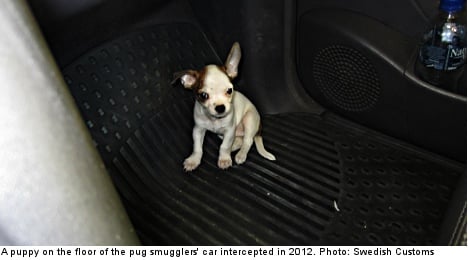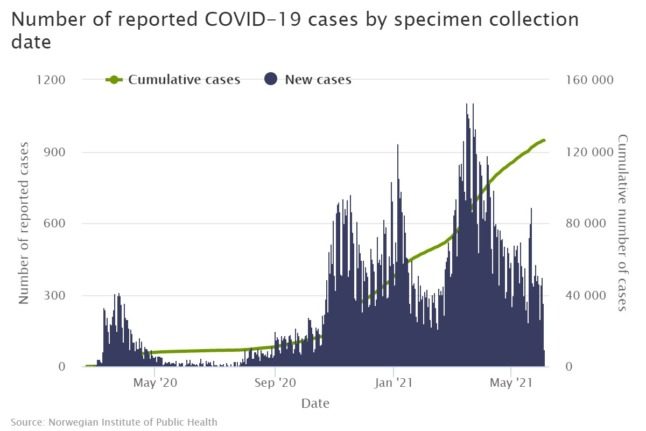The car was jammed with plastic bags, a crumpled jacket, ripped cardboard, discarded newspapers, an empty box of the Polish chocolate Marokko… and 22 puppies.
“They were so tiny they couldn’t possibly be old enough to travel,” recalls Josefin Runesson at Swedish Customs (Tullverket) who was put in charge of investigating the case in 2010.
“It was an obvious case of smuggling,” she tells The Local.
Some of them were shoved into a Chiquita banana box, others had been put in a metal cage which in turn was placed in a sports bag. That, in turn, had been zippered shut so that the West Highland terriers and the French bulldogs could not be seen from the outside.
In the boot of the car, pomeranians and chihuahuas jostled for space in confining boxes.
“There was urine and excrement everywhere,” Runesson explains.
One of the Westies was dangerously close to hypothermia. Only three of the dogs had identity chips; one of the French bulldogs oddly had two chips but only one was linked to a registered pet passport, which all dogs travelling within the EU must have.
The driver of the car was eventually charged not only with dog smuggling but with cruelty to animals.
When veterinarians from the Swedish Board of Agriculture (Jordbruksverket) were called to the scene, all the puppies had to be put down.
In 2010, customs officials intervened more than ten times in the south of Sweden, where most smugglers make their way into the country. They discovered more than 50 dogs, including the big haul of 22 puppies.
CLICK HERE FOR MORE PICTURES OF THE SMUGGLED PUPPIES (WARNING: GRAPHIC CONTENT)
The number of apprehended smugglers dipped slightly in 2011, with only four arrests involving nine smuggled dogs. But authorities and animal rights observers noted that those figures may only represent the tip of the iceberg.
And in 2012, the apprehension rate picked up again, with nine interventions by customs officials resulting in 22 confiscated dogs between January to August.
Apart from the torture-like conditions that many of the dogs are subjected to in ‘dog farms’ and then during transport, officials are also concerned about the health risks posed by the contraband pups.
“We don’t have rabies in Sweden and we’d like to keep it that way,” Peter Diemar at the Agriculture Board says.
Yet, despite avoiding the virus, Sweden has seen the introduction of other potentially dangerous parasites.
“Unfortunately, we already have cyclophyllid tapeworm (rävens dvärgbandsmask) but we don’t want to add to it,” Diemar adds.
Swedish author Daniel Sjölin theorized in his 2007 book Världens sista roman (‘The World’s Last Novel’) that American heiress Paris Hilton’s chihuahua was indirectly responsible for introducing the parasite to Sweden. The breed’s status as a cute accessory certainly seemed to spur on demand for the toy dogs.
“There weren’t enough chihuahua breeders in Sweden when they became popular,” senior advisor Siw Ågren at Animal Rights Sweden (Djurens Rätt) tells The Local.
“So it became a lucrative market for smugglers.”
The recent figures also seem to reflect the changing trends in preferred dog breeds. While six chihuahuas were included in the big 2010 haul of 22 puppies, the biggest discovery the following year was a pug-exclusive affair. All eleven of them had to be put down after being smuggled in from Hungary via Germany and arriving in the Swedish town Trelleborg on a ferry.
“Nowadays, there are a lot of pugs and French bulldogs,” Diemar confirms.
“Previously we saw more chihuahuas, and it probably reflects what is in fashion.”
Diemar explains that many dog smugglers use the internet to market their goods, adding that the amount of money changing hands is no laughing matter.
“We’ve seen extreme cases where Swedes part with 16,000 kronor ($2,400) to buy a puppy in a parking lot because they’ve seen an ad on a buy-sell site like Blocket,” he says.
“As long as this market exists and as long as people are naive, this smuggling will, in all likelihood, continue.”
Diemar says Blocket.se, Sweden’s biggest buy-sell site, has cooperated with his organization several times to crack suspected dog smuggling cases.
“If we see that one particular dog breed is popping up more frequently we’ll run a check on the puppies’ registration numbers or check their mother,” Thomas Bäcker, customer security advisor at Blocket.se, tells The Local.
“We seem to notice that the problem overall is decreasing, and both customs officials and the agriculture board have become much more alert about the issue. But we at Blocket have given potential smugglers hell, so it is possible they’ve moved on to other buy-sell sites,” said Bäcker.
“Our advice to help stop this is to undercut the market by reducing demand: don’t buy.”
Ann Törnkvist




 Please whitelist us to continue reading.
Please whitelist us to continue reading.
Member comments